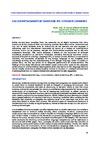Identificador persistente para citar o vincular este elemento:
https://accedacris.ulpgc.es/jspui/handle/10553/45595
| Campo DC | Valor | idioma |
|---|---|---|
| dc.contributor.author | García Sánchez, María Soraya | - |
| dc.date.accessioned | 2018-11-22T11:04:42Z | - |
| dc.date.available | 2018-11-22T11:04:42Z | - |
| dc.date.issued | 2016 | - |
| dc.identifier.issn | 1302-6488 | - |
| dc.identifier.other | WoS | - |
| dc.identifier.uri | https://accedacris.ulpgc.es/handle/10553/45595 | - |
| dc.description.abstract | Online courses have benefited from the adequate use of digital resources that allow learners to be the center of their own learning process. More often online instructors not only aim at what students have to individually do but learners are also engaged in interacting with the educational community by means of a variety of metacognitive activities, which can be planned, thought and accomplished anywhere and at any time (ubiquitous learning). This article proposes a debate on the awareness of strategic knowledge acquisition to particular situations providing interactive scenarios among students of English as a Foreign Language (EFL) in online courses. Without communicative activities, the successful production of any foreign language is not complete since knowledge building and the understanding of the foreign language, either in written or spoken form, are the key points of an adequate performance of communication. The findings of this study will provide information about useful online tasks for the adequate performance of communicative metacognitive skills required in an EFL language distance course. Finally, some future research paths inclined to improve EFL distance learners from a metacognitive and ICT-based collaborative perspective are also suggested. | - |
| dc.language | eng | - |
| dc.relation.ispartof | Turkish Online Journal of Distance Education | - |
| dc.source | Turkish Online Journal of Distance Education,v. 17, p. 76-90 | - |
| dc.subject | 57 Lingüística | - |
| dc.subject.other | Autonomous learning | - |
| dc.subject.other | Communication | - |
| dc.subject.other | Distance learning | - |
| dc.subject.other | EFL | - |
| dc.subject.other | U-learning | - |
| dc.subject.other | Higher-Education | - |
| dc.title | Online metacognitive tasks for efl distance learners | - |
| dc.type | info:eu-repo/semantics/Article | - |
| dc.type | Article | - |
| dc.identifier.doi | 10.17718/tojde.60563 | - |
| dc.identifier.scopus | 84994361349 | - |
| dc.identifier.isi | 000439584100005 | - |
| dc.contributor.authorscopusid | 36987907900 | - |
| dc.description.lastpage | 90 | - |
| dc.identifier.issue | 4 | - |
| dc.description.firstpage | 76 | - |
| dc.relation.volume | 17 | - |
| dc.investigacion | Artes y Humanidades | - |
| dc.type2 | Artículo | - |
| dc.contributor.daisngid | 3075046 | - |
| dc.description.numberofpages | 15 | - |
| dc.contributor.wosstandard | WOS:Gadcia-Stadrulez, S | - |
| dc.date.coverdate | Enero 2016 | - |
| dc.identifier.ulpgc | Sí | es |
| dc.description.sjr | 0,223 | |
| dc.description.sjrq | Q3 | |
| dc.description.esci | ESCI | |
| item.fulltext | Con texto completo | - |
| item.grantfulltext | open | - |
| crisitem.author.dept | GIR Discourse, Communication and Society | - |
| crisitem.author.dept | Departamento de Filología Moderna, Traducción e Interpretación | - |
| crisitem.author.orcid | 0000-0003-1095-9410 | - |
| crisitem.author.parentorg | Departamento de Filología Moderna, Traducción e Interpretación | - |
| crisitem.author.fullName | García Sánchez, María Soraya | - |
| Colección: | Artículos | |
Citas SCOPUSTM
1
actualizado el 08-jun-2025
Visitas
72
actualizado el 11-ene-2026
Descargas
87
actualizado el 11-ene-2026
Google ScholarTM
Verifica
Altmetric
Comparte
Exporta metadatos
Los elementos en ULPGC accedaCRIS están protegidos por derechos de autor con todos los derechos reservados, a menos que se indique lo contrario.
